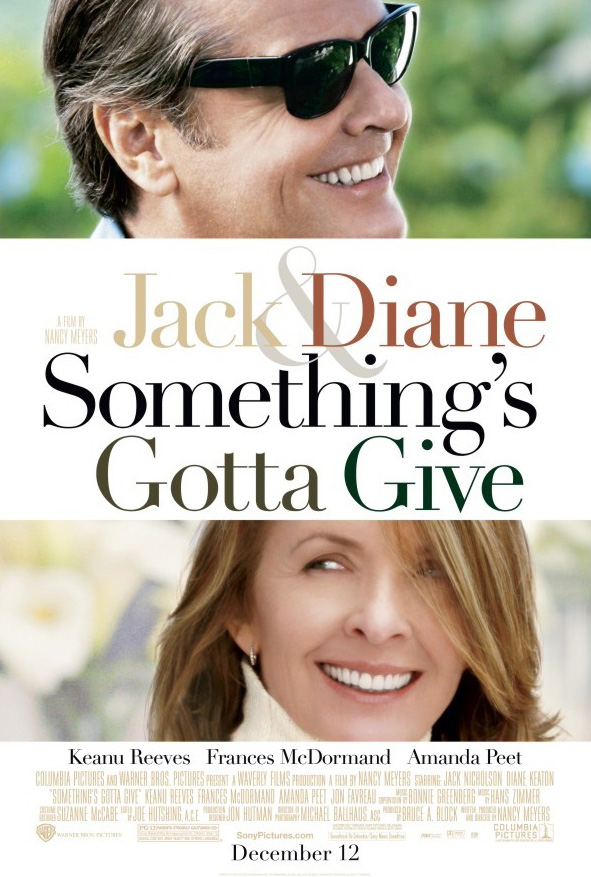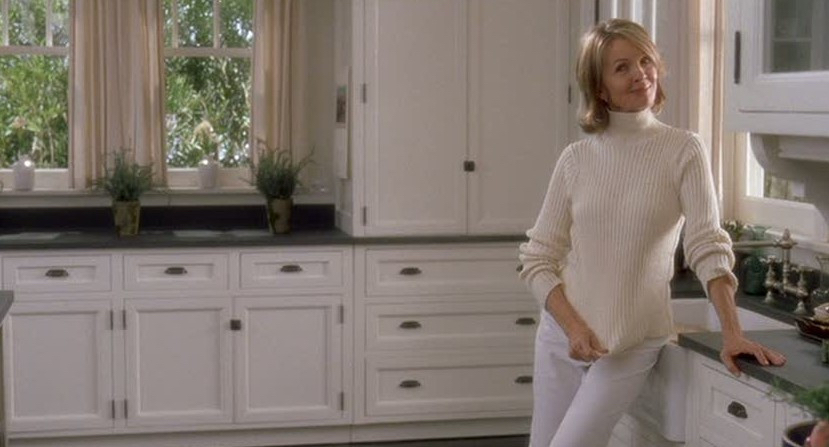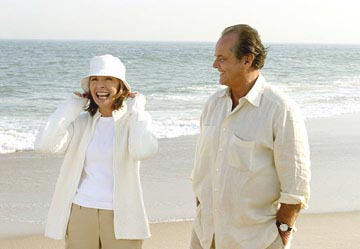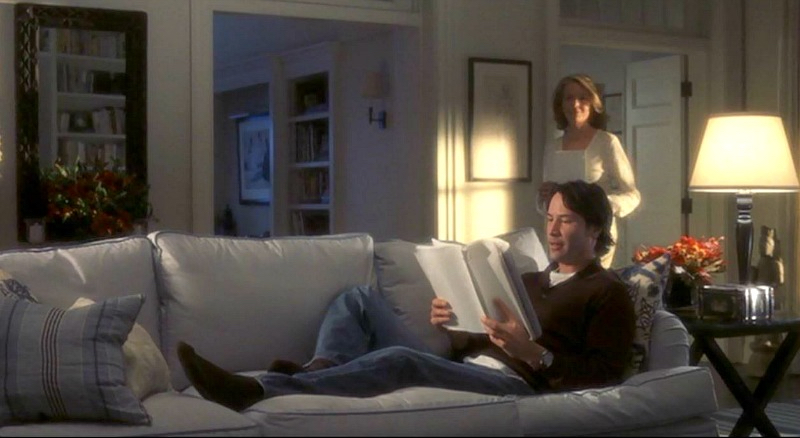Week of April 26 – May 2, 2020
Romance can make one forget about one’s problems, even if it is occurring with other people, and we are only experiencing it vicariously. Such is the appeal of Something’s Gotta Give, a mature romance movie from 2003. How mature? The leads, Diane Keaton and Jack Nicholson, were in their sixties when they made it; even with their combined star power, one studio which shall remain nameless declined the project because they were “too old.” Balderdash. Kudos to Sony for picking up the project, which became the # 1 movie in America for a brief time. And while Nicholson finally retired after How Do You Know in 2010, Diane Keaton is still out there making popular movies almost twenty years later.

Erica Barry (Diane Keaton) is a successful playwright who is not so successful in the game of love. Her marriage crumbled, and her ex- is dating a woman half his age. More troubling, Erica’s grown daughter Marin (Amanda Peet) likes dating older men — and she shows up at their Hamptons beach home with a guy older even than Erica for a romantic weekend. That guy is Harry Sanborn (Jack Nicholson), who quickly realizes that he is not exactly welcome in Erica’s house. But Erica lets him stay because she is polite — and Harry has a heart attack while smooching with Marin. The next thing you know Harry is recuperating at the beach house with Erica forced to babysit him.
Two things of importance occur during Harry’s convalescence. He finds that, as much as Erica irritates him (and vice versa), he actually likes being around her. For a man who enjoys the company of young women, this is quite a surprise to him. The second complication is that Erica’s charm also bowls over Julian Mercer (Keanu Reeves), the doctor who is treating Harry. Julian knows Erica’s plays and is even more impressed by her in the flesh. Suddenly, as so often happens in real life, a woman who has become accustomed to self-sufficiency finds herself the object of affection by two disparate would-be lovers. In Erica’s case, she sees Harry as her daughter’s misbegotten boyfriend, and Dr. Julian as too young to take seriously. And yet . . .

This romantic triangle is just as smart, clever, funny and sexy as one with participants half their age in any other movie. Nicholson and Keaton spar with one another like a featherweight fight, landing some verbal blows, but also recognizing that they like each other too much to really fight. Little by little they fall for each other, only to split when Harry goes back to his old habits. Erica and Julian are just as charming and feel right together, too. I must say, Keanu Reeves has never been more charming or appealing. His casual self-confidence is, indeed, catnip to perceptive viewers. In most of this type of romantic movie dilemma, it is easy to predict with whom the protagonist will remain; here, it is completely up in the air.
After Erica breaks up with Harry, she endures six months of sobbing, and writing. And more sobbing, and more writing. Still more sobbing, and still more writing. At the end of this pretty darn funny montage, Erica has a new play. Harry notices that the play, about to start previews, has certain resemblances to their relationship, and this becomes fodder for even more comedy. He leaves, again, and life moves on for everyone. One last visit takes Harry to Paris, where Erica is enjoying her birthday. He finally unburdens his heart to her, only to be interrupted by the arrival of Julian, who has accompanied Erica on her birthday trip. The climax arrives: will she stay with Julian, or take Harry back? Honestly, I would have been okay with either choice — Erica at this point can be happy either way.

The chemistry in this romantic comedy is fabulous. Keaton and Nicholson had co-starred (and trysted) way back in Reds (1981), and more than twenty years later they are still great together. I hadn’t seen a Nicholson film in quite a while before I watched this again recently, and I’d half-forgotten what a great actor he is. Harry could have been (and comes close to being) a real jerk of a character, but Nicholson’s restraint and rock solid core of a character keeps him real, and ultimately a guy you can’t help but root for as he revisits his earlier sins looking for validation. Even in his sixties, he is still leading man material, much as Cary Grant remained throughout the twilight of his career.
But the film is undeniably Diane Keaton’s. In a role written for her by writer-director Nancy Meyers, Keaton shines like the sun. Less neurotic than in other films, she grounds her character in the details of her existence and the relationships that keep her sane. Keaton is completely believable as a woman betrayed by love, buoyed by a successful career but unsure if she actually deserves that success. Then Erica reluctantly accepts that these men are igniting feelings inside her that she has previously rejected, and life’s possibilities open her up like a flower blossoming in the sunlight.

In a world where the box office is dominated by comic book adventures and films tailored to spotlight performers in their twenties (or younger!), it is not just a nice surprise to find this type of quality adult entertainment, but it’s a relief. Movies are not just for the young. And, of course, anyone of any age can enjoy this story; the quest for love is a universal need; finding it later in life is just that much sweeter. As people age yet remain active ever later into life, films like this should be ever more frequent, since they would reflect the population at large. Sadly, I don’t think that will be the case.
Something’s Gotta Give was quite popular, and earned Diane Keaton her fourth Oscar nomination. It’s success proved to the studios, and the media, that movies about older people (not quite senior citizens, at least) could be good box office, and mightily entertaining to watch. And that a believable, compelling, mature female lead could carry a story. Since this film, Nancy Meyers has written and directed a few others, most notably the similar comedy It’s Complicated in 2009, but I think Something’s Gotta Give remains her best solo work (she used to partner with co-writer Charles Shyer, who directed their scripts). It is widely available on DVD, so if you need a dose of girl power, and you’ve seen Wonder Woman kick butt more than once, try the charm and intimacy of this bright comedy. ☆ ☆ ☆. Backdated to April 26, 2020.
Similar movies include Irreconcilable Differences (1984); Protocol (1984); The Parent Trap (1961 and 1998); The Holiday (2006); and It’s Complicated (2009).
